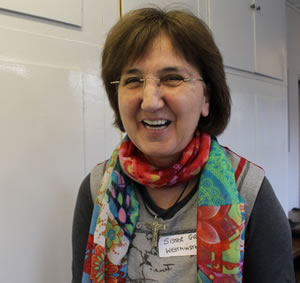Chiswick Nun Inspires Young People To 'Turn on the Taps'
Lent appeal aims provide clean water across the world
A Chiswick volunteer and ex-missionary in Africa, has been inspiring pupils in the area to raise money for Catholic charity CAFOD and ‘Make a Splash' this Lent.
Their efforts will help provide clean and safe water across the world as part of this year's CAFOD Lent fundraising campaign.
Sister Graca Almeida, 62, from Chiswick, is a member of the Comboni Missionary Sisters. She is also a CAFOD schools and confirmation volunteer.

Sister Graca, who has so far spoken over 100 children about the appeal said, “I was out doing my shopping when one of the many children who attended one of my recent school assemblies excitedly squealed ‘It's the CAFOD lady'.
“Such a small day-to-day occurrence would usually not be enough to brighten up my Monday. However, this tiny thing surely meant children were interested in CAFOD and CAFOD's work.
“CAFOD's Lent appeal this year focuses on clean water; and having seen and lived through the effects of this in Ethiopia, it is a campaign I fully support and it excites me to spread the word to young people. We need volunteers to talk and share stories about Lent and show what the money raised can do for people in countries across the world. "
This Lent, money raised will enable the taps to be turned on across the world by repairing or providing water pumps and training in order to maintain them. It will also fund hygiene programmes, education in sanitation and the building of latrines. Matched funds from the UK Government will enable access to clean water, sanitation and hygiene programmes to over 300,000 people in Uganda, Zimbabwe and the Democratic Republic of Congo.
In an added boost, money raised by pupils for the CAFOD appeal will be doubled by the UK Government's Department for International Development up until May. Parliamentary Under-Secretary of State, Nick Hurd, said: “By doubling every pound raised, together we can ensure that 300,000 people, especially young girls, can go to school rather than walking miles to collect water, can be protected from disease, and live healthy, productive lives.”
Sister Graca said, “Something that will always resonate with me, is when I attended an Ethiopian mother's young son who was sick and gave him clean water. His mother responded with, ‘and this is?' questioningly. She had never seen clean water; at the age of 33 the only water she had seen was dirty, brown, sludge."
Right now, 650 million people are living without access to clean water. 2.5 billion People lack something as basic as a toilet and sewage system to flush away their waste. It is also estimated that women and girls spend 125 million hours a day collecting water, which means time away from work, school or playing with friends.
March 5, 2016